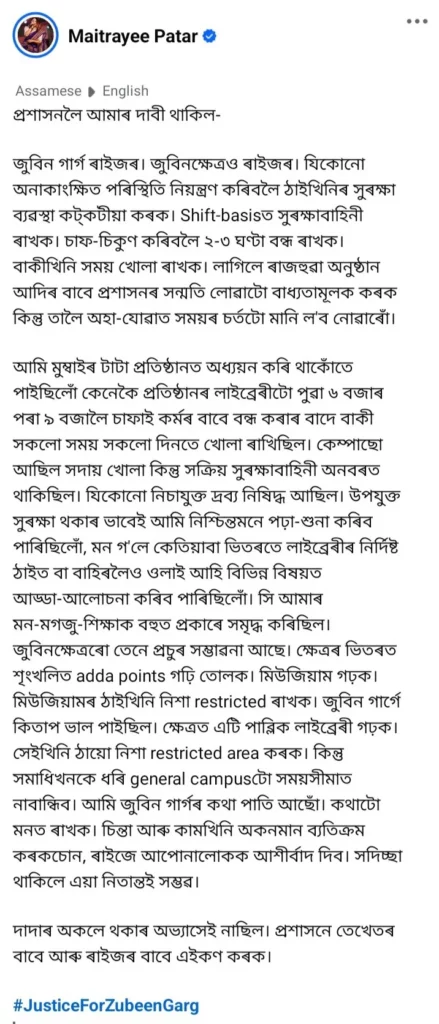Guwahati: Assamese vocalist Maitrayee Patar has issued a public appeal to authorities, calling for improved management and security at Zubeen Kshetra, the memorial dedicated to the iconic singer Zubeen Garg. In a recent Facebook post, Patar stressed that both the singer and the site belong to the public, and she urged the administration to establish a “robust and disciplined security system” to proactively prevent any unfortunate incidents.
Patar outlined specific suggestions for the site’s operation. She proposed deploying security personnel in shifts to ensure continuous presence. For maintenance, she suggested a temporary closure of the site for two to three hours daily for cleaning, while keeping it accessible to the public during thei remaining hours. Furthermore, Patar recommended that all public events or programs held within the premises should require official administrative permission. Crucially, she emphasized that general public movement within the memorial grounds should not face “unnecessary restrictions” during reasonable hours.
Drawing on an experience from her past, Patar referenced the open-yet-secure environment she witnessed while studying at the Tata Institute in Mumbai. She noted that the institution maintained continuous public access to its campus, with cleaning scheduled from 6 AM to 9 AM, alongside a constant and strong security presence. Patar highlighted that this policy allowed students to engage in academic and creative discussions, significantly enriching their educational experience.
Envisioning a similar vibrant, intellectual atmosphere for Zubeen Kshetra, Patar put forward additional recommendations. She proposed establishing organized “adda points” (discussion spaces), a dedicated museum to Zubeen Garg, and a public library within the site. She suggested that while the library and museum could remain restricted at night, the general campus area, including the memorial site, should not be subjected to rigid time restrictions. Patar underscored the importance of the library, reminding authorities that Zubeen Garg “loved books” and that a library would be a highly fitting tribute to his memory.
Concluding her heartfelt appeal, Patar urged the administration to approach the project with a fresh perspective, recognizing Zubeen Garg’s stature. “We are talking about Zubeen Garg—remember that,” she wrote, adding, “Let your thoughts and actions be a little different; the people will bless you for it. If there is goodwill, it is entirely possible. Zubeen Dada was never alone—the administration should do this for him and for the people.”


